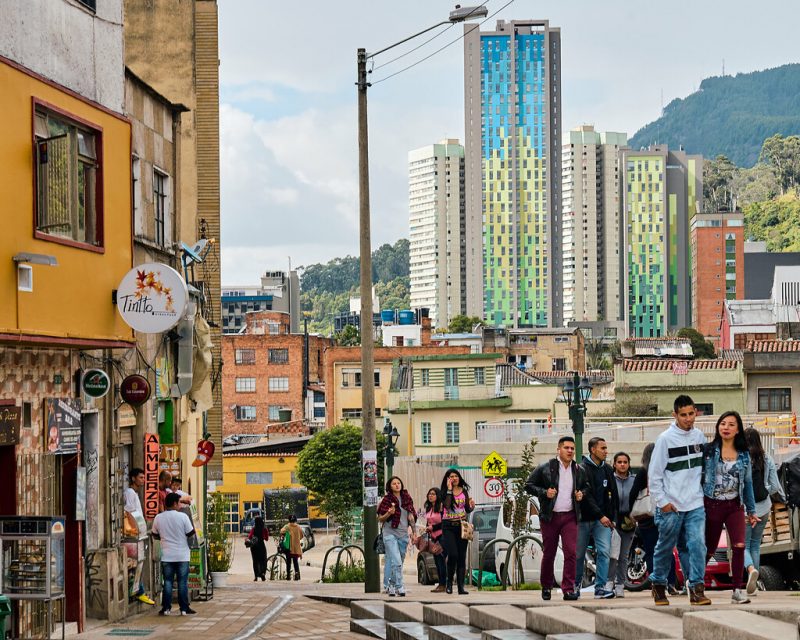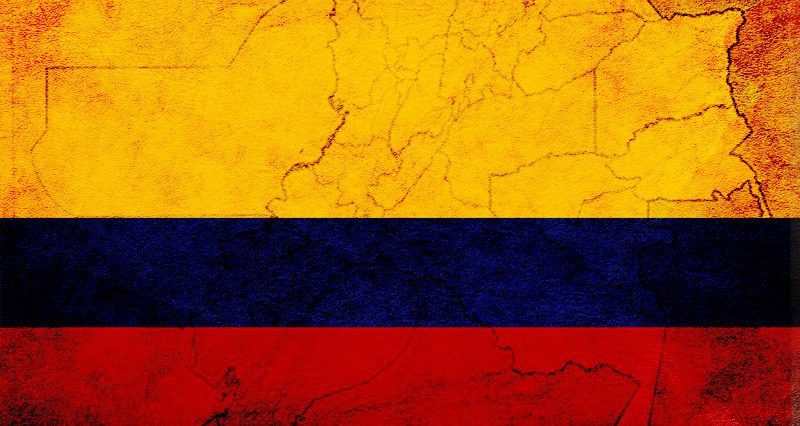(see part 1 – The saga of Colombia: tragedy and rebellion in Latin America, XX-XXI century)
The Colombian government’s corrosive stance towards Venezuela is well known. Duque has made his position very clear, maintaining a full diplomatic blockade. He considers Venezuelan President Nicolars Maduro a dictator who violates human rights of his own population in order to maintain power over a freedomless country shattered by crisis.
Meanwhile, the threat of invasion, an option that is repeatedly brought back onto the table, seems to be out of favor. Some governments in the region (members of the Lima Group) are working with the US and Canada to remove Maduro from power by demanding new elections, all of them recognizing Juan Guaidó (recently honored by Trump at his state of the union address) as “interim president.”
This is also where Colombian criminal organizations come into play. Venezuelan authorities recently reported the capture of 14 members of the narco-paramilitary group ‘Los Rastrojos’ in Boca de Grita, Tachira which borders Colombia. ‘Los Rastrojos’ are accused by Colombian authorities of being a paramilitary organization dedicated to drug trafficking and illegal mining, responsible for hundreds of murders on both sides of the Venezuelan-Colombian border. More recently they became widely known over controversial leaked photos of its members with Venezuelan opposition congressman Juan Guaidó in 2019 before the ‘Venezuela Aid Live’ concert held in the Colombian city of Cucuta.
The saga of Colombia: tragedy and rebellion in Latin America, XX-XXI century (PART 1)
In the 21st century, wars are being fought in multidimensional multivector scenarios. Colombia plays an important role in a strategic maneuver that goes far beyond Venezuela and the continent’s borders. On January 20, Bogotá hosted the III Hemispheric Ministerial Conference to Combat Terrorism. Mike Pompeo attended and praised Colombia’s designation of Hezbollah as a terrorist organization, joining Argentina, Paraguay and Honduras. Washington is pushing the narrative that together with Iran, the Lebanese party is working with Maduro’s government and other non-state actors such as the FARC-EP, anti-American governments and criminal and drug trafficking organizations. “We all know too that the Iranian regime’s top terrorist proxy Hezbollah has found a home in Venezuela under Maduro” Pompeo said in Bogota. “We have seen the presence of Hezbollah cells in countries like Venezuela, seizing the consent and connivance of the Nicolas Maduro dictatorship,” Iván Duque added.
Speaking before the Senate Armed Services Committee on Capitol Hill (31 january 2020) Adm. Craig S. Faller, head of the US Southern Command, called this political nexus a “vicious circle of threats that deliberately erodes the security and stability of this region (LatAm)…Transnational criminal organizations and external states actors like China, Russia, Iran, and violent extremist organizations are trying to advance their interests at the expense of U.S. and partner-nation security.”
During his most recent visit to Washington (March 2020), Duque held a last minute joint press conference with Trump, gave a lecture at the CFR and delivered a speech at the American Israel Public Affairs Committee (AIPAC). Addressing in English, Duque reminded attendees that his government has been receiving support from US and Israel to fight terrorism over a protracted time, and along with other Latin American countries they have “decided to adopt the terrorist lists of the US ant the EU…organizations such as Hezbollah need to be destroyed (applauses), like ELN, like the FARC dissidences, like Hamas…The dictatorship of Venezuela has also the traces of anti-semitism, and they have also opened the doors for Hezbollah.” Ultimately, he announced a visit to Israel to set in motion a free trade agreement between both countries.
FINAL WORDS
Latin America has an immense amount of natural wealth, that is no secret. The largest oil basin on the continent is located only a few kilometers away from Florida (Venezuela, Colombia and the Gulf of Mexico). Argentina, Chile and Bolivia are part of South America’s so-called “lithium triangle” which holds 54% of the world’s lithium resources. The Amazon rainforest is the planet’s richest region in terms of biodiversity. South America has the largest amount of freshwater resources both per capita and per area on a global scale. Undoubtedly, natural resources have always been at the core of US interest over the continent, and Colombia has become a platform situated right in its center, crucial for the full-spectrum dominance that the US is trying to create (Ceceña). It is a country pierced by a 70-year-old armed conflict during which more than 460,000 people lost their lives, 200,000 between 1948 and another 260,000 between that date and 2018 (conservative figures).
Whilst the US discourages direct action, it delegates or fulfills coordination functions within an enormous radius of action, relying on military positions that have multiplied since the Obama and Hillary Clinton governments. Along with the 9 US military bases in Colombia, another 60 military bases are deployed across the continent (outside the US and Canada), most of which are concentrated in Central America and the Caribbean, which suggests other possible clandestine or contingent-use bases are also present.
Given Colombia’s accumulated experience, its security model has been projected as broadly as possible. The Colombian military is working to transfer its skills to other countries, training thousands of military and police forces in Central America, Mexico and other countries. In Washington’s eyes, Colombia is a role model for Latin America.

Flickr
Colombia is becoming even more important to the US as a stable stronghold which can sustain itself, offer safe haven, obtain support and operate outward in the midst of a dire situation at a global and continental level. However, these historical allies are now experiencing chaotic situations. For instance, Chile, one of Washington’s strongest allies in the region, has been experiencing unprecedented social unrest in the form of a popular revolt that has demolished the myths surrounding one of the most extolled economic models by capitalists and liberal governments.
Duque is also facing staggering challenges at home. An unparalleled number of Colombians have taken to the streets against the announcement of unpopular reforms aimed at deepening the country’s neoliberal model. Innovative manifestations on multiple fronts with massive support, heterogeneous social components and a strong anti-systemic tone, including confrontation against the security forces, have resulted in hundreds of people being wounded and some deaths. After years of terror and fear, popular opposition seems to be back and consolidating (something common in other countries for decades) alongside national agrarian strikes, trade union strikes, student strikes; mobilizations developed in parallel with the peace dialogue process.
Colombia is one of the most unequal countries in the world, with poverty concentrated in rural areas and wealth overwhelming accumulated in the hands of a small group. Nearly half of its population lives in poverty and more than 6.3 million have had to leave their land after surviving massacres carried out by the army and paramilitaries, or the glyphosate sprayed during Plan Colombia.
Complex systems of domination have been forged in Latin America. Local elites (media, politics, business men, police-military, etc.) converge with external apparatuses that are part of the US system of power, shaping a form of capitalism underpinned by the plundering of natural resources, financial speculation and growing marginalization (Beinstein). Despite all this, we are facing an open-ended dispute between social forces that are desperately trying to survive, and in doing so , are forced into confrontation with the domination system; they may bring forth a vast national regeneration and radical anti-systemic movement.
To this day, “the United States continues to exercise a proprietary role at times of apparent threat to its national security, and the Western Hemisphere remains a predominantly US sphere of influence.” We heard the same message from Trump at the 73rd Session of the United Nations General Assembly (2018) where he said: “Here in the Western Hemisphere, we are committed to maintaining our independence from the encroachment of expansionist foreign powers. It has been the formal policy of our country since President Monroe that we reject the interference of foreign nations in this hemisphere and in our own affairs.” One way or another, it is clear that the Monroe Doctrine is alive and kicking in South America– but we should never forget that Latin America has always been prone to rebellion.
SOME BASIC REFERENCES
-ANTON, Michael. 2017. America and the Liberal International Order. American Affairs Volume I, Number 1 (Spring 2017): 113–25. https://americanaffairsjournal.org/2017/02/america-liberal-international-order/
-ANTON, Michael. 2019. Trump Doctrine. Foreign Policy magazine. Spring 2019. https://foreignpolicy.com/2019/04/20/the-trump-doctrine-big-think-america-first-nationalism/#
-BEINSTEIN, Jorge. 2018. Las nuevas dictaduras latinoamericanas.
http://www.noticiaspia.com/2018/03/20/las-nuevas-dictaduras-latinoamericanas/
-BIDEN, Joseph R. Biden, Jr. 2020. Why America Must Lead Again. Rescuing U.S. Foreign Policy After Trump. Foreign Affairs. March/April 2020
https://www.foreignaffairs.com/articles/united-states/2020-01-23/why-america-must-lead-again
-CECEÑA, Ana Esther. 2017. Los territorios de la guerra, las guerras del territorio.
https://www.alainet.org/es/articulo/188005
-CECEÑA, Ana Esther. 2010. Militarización en las Américas. Conferencia en el Foro Social Américas Paraguay.
-GONZALEZ CASANOVA, Pablo. 2017. La guerra y la paz en el siglo XXI. http://www.noticiaspia.com/2017/01/30/la-guerra-y-la-paz-en-el-siglo-xxi/
-HAASS, Richard. Liberal World Order, R.I.P. Project Syndicate. March 21, 2018. https://www.project-syndicate.org/commentary/end-of-liberal-world-order-by-richard-n–haass-2018-03
-LINDSAY-POLAND, John. 2018. Plan Colombia : U.S. ally atrocities and community activism. Duke University Press.
-MERINO, Gabriel Esteban. 2016. “Tensiones mundiales, multipolaridad relativa y bloques de poder en una nueva fase de la crisis del orden mundial. Perspectivas para América Latina”. Geopolítica(s). Revista de estudios sobre espacio y poder, vol. 7, núm. 2, 201-225.
-PUTIN, Vladimir. 2014. Club Valdai Speech.









Leave a Reply